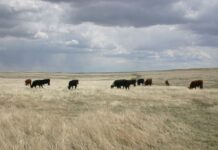K-State hosts nine minority fellows from across the country
MANHATTAN, Kan. – Before this summer, aspiring veterinarian Olivia Cooper never imagined that she would add ‘fly catcher’ to her growing list of skills.
Yet, the junior-to-be at Tuskegee University spent a good portion of her summer break doing just that as part of a Kansas State University program that gives minority students a head start on graduate or professional school.
K-State Research and Extension and the university’s College of Agriculture hosted nine minority undergraduate students from across the country for the 2021 summer research fellows program, which pairs the students with faculty mentors to conduct research and learn about careers in food, agriculture and related sciences.
In addition to hands-on research with faculty mentors, the students learned about applying to and finding funding for graduate school, using library databases, diversity in the workplace, applying ethics to research, how to communicate research findings effectively, and more.
Cooper, a pre-vet student, was paired with K-State assistant professor in the Department of Entomology Cassandra Olds in a project that monitored the movement of houseflies in cattle feedlots.
The project, she said, included catching flies in feedlots, then marking them with different colors and releasing them in order to track where they move throughout the facility over 24 hours. Their work took place at the university’s Beef Stocker Unit.
“If you think about these houseflies and how they move throughout the day, they come into contact with a lot of different surfaces that are otherwise geographically separated,” Olds said. “They can feed on the animal feed, land on the animals themselves, move to the water areas, feed on the manure… They have a chance to pick up bacteria from all these different places and spread them throughout the facility.”
By studying flies and their movements within a feedlot, researchers hope to determine the risks posed by houseflies acquiring bacteria from one part of the facility and transmitting it to other areas – and then, what the researchers can do about it.
“I didn’t understand how entomology was related to animal health or animal medicine,” Cooper said, “but after being in this program, I came to understand how insects are vectors of disease and because of that, they are able to transmit those diseases to animals, which aligns with my career path.”
Another summer research project explored ways to manage public waterways to prevent the growth of harmful algae blooms, commonly known as blue-green algae.
“I didn’t realize that so much work went into keeping our water bodies the way they need to be in order to keep them safe for recreation and drinking water,” said Brian Washington, a junior at Florida A&M, who was mentored by Susan Metzger, an associate director for the Kansas Center for Agricultural Resources and the Environment.
Metzger said the program helped Washington not only learn about cyanobacteria and harmful algae blooms, but he was also able to build a network of professionals working in the same area via weekly meetings in person or by computer.
“What I’ve had the pleasure of seeing is the way that Brian has grown in confidence, as well as being intentional – asking questions and building his future network of professional resources,” she said.
Other students that participated this summer, and their faculty advisors, include:
• Mikiyah Balwin, Florida A&M University, who worked with Zelia Wiley, director of the K-State College of Agriculture diversity programs office, and communications and agricultural education instructor Brandie Disberger.
• Meghan Campbell, Florida A&M University, who worked with animal sciences and industry associate professor Jayendra Amamcharla.
• Rajion Hall, Prairie View A&M University, who worked with grain science and industry professor Greg Aldrich.
• Tiffany Poydras, Southern University (Louisiana), who worked with agronomy associate professor Colby Moorberg.
• Khairy Jenkins, North Carolina A&T State University, who worked with grain science and industry associate professor Chad Paulk, and grain science and industry professor Charles Stark.
• Karrington Howard, University of Alabama-Birmingham, who worked with grain science and industry professor Greg Aldrich.
• Janaye Young, Delaware State University, who worked with animal sciences and industry professor Karen Schmidt.
“I got into this program to see what opportunities are out there for my major,” said Washington, who is studying water management and conservation. “It’s really helped me see what I can do with the major. I’m considering graduate school once I finish my undergraduate program. This summer program has given me more direction for that.”
Wiley, who is the program’s coordinator, said each of the students “represented their school well and contributed to innovative research in our college.”
More information about future undergraduate research opportunities and K-State’s efforts to support diversity in the College of Agriculture is available online.
-30-
FOR PRINT PUBLICATIONS: Links used in this story
K-State College of Agriculture, www.ag.k-state.edu
K-State Beef Stocker Unit, www.asi.k-state.edu/about/facilities/Beef-Stocker-Unit.html
K-State College of Agriculture Diversity Programs Office, www.ag.k-state.edu/about/diversity
K State Research and Extension is a short name for the Kansas State University Agricultural Experiment Station and Cooperative Extension Service, a program designed to generate and distribute useful knowledge for the well being of Kansans. Supported by county, state, federal and private funds, the program has county extension offices, experiment fields, area extension offices and regional research centers statewide. Its headquarters is on the K State campus in Manhattan. For more information, visit www.ksre.ksu.edu. K-State Research and Extension is an equal opportunity provider and employer.
For more information:
Zelia Wiley
785-532-5793
[email protected]
Story by:
Pat Melgares
785-532-1160
[email protected]





